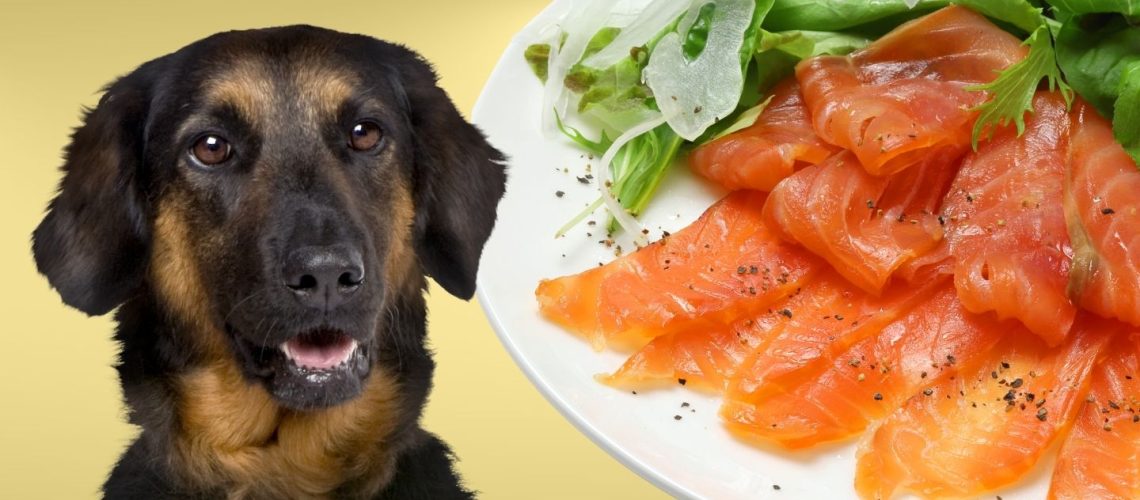Smoked salmon is a popular delicacy that many dog owners are tempted to share with their furry companions. However, questions may arise regarding the safety and health implications of feeding smoked salmon to dogs. In this comprehensive guide, we’ll explore whether smoked salmon is bad for dogs and provide pet owners with everything they need to make informed decisions about incorporating this fishy treat into their dog’s diet.
An Overview of Smoked Salmon
Before determining if smoked salmon is suitable for canine consumption let’s first understand what exactly smoked salmon is.
Smoked salmon begins as fresh salmon that is cured with salt then hot or cold smoked. This preservation and flavor-infusing process results in the characteristic smoky salty taste. The smoking can be done with various types of wood, imparting a range of subtle flavors.
This delicacy is valued for its velvety texture, savory umami taste, and nutritious omega-3 fatty acid content. However, the curing and smoking process also increases the sodium content significantly compared to fresh salmon.
Potential Benefits of Smoked Salmon for Dogs
When fed in moderation, smoked salmon can provide some benefits for dogs:
-
Protein: Salmon is a high-quality source of protein, which dogs need for energy and muscle maintenance. Smoking does not significantly degrade the protein levels.
-
Omega-3 Fatty Acids: Salmon is rich in anti-inflammatory omega-3s, which can benefit dogs’ skin, coat, joints, heart, and brain health.
-
Flavors and Texture: The smoky flavor and smooth texture may appeal to some picky dogs who reject other fish or proteins.
-
Occasional Treat: Small amounts of smoked salmon can add flavor and variety to a dog’s diet as an occasional treat.
Potential Risks of Smoked Salmon for Dogs
However, there are also some potential risks to be aware of when feeding dogs smoked salmon:
-
High Sodium Content: The salt used to cure the salmon significantly increases its sodium levels, which could cause excessive thirst, vomiting, diarrhea and even sodium ion poisoning in dogs if large amounts are consumed.
-
Bones: Smoked salmon often contains small soft bones that can pose a choking hazard or damage the digestive tract. Bones must be meticulously removed before feeding to dogs.
-
Fat Content: The high fat levels in salmon can trigger pancreatitis in dogs prone to the condition. Fatty foods should make up no more than 10% of a dog’s diet.
-
Allergies: While rare, some dogs may have allergies to fish or salmon that could cause itching, digestive upset, or skin irritation.
-
Toxins: Smoked salmon made for humans might contain additives like onion, garlic, or spices that are toxic for dogs. Only plain salmon should be fed.
-
Preservatives: Smoked salmon cured with nitrates or nitrites can be dangerous if consumed in large quantities over time. Home-smoked varieties are preferable.
Feeding Guidelines for Smoked Salmon
When feeding smoked salmon to dogs, follow these tips to minimize risks:
-
Only offer smoked salmon occasionally as a treat, not as a dietary staple or in large portions. Treats should make up no more than 10% of a dog’s daily calories.
-
Select plain smoked salmon without any seasonings, spices, onion, garlic or chemical preservatives.
-
Carefully inspect the salmon and remove all bones before feeding.
-
Reduce sodium intake by rinsing off excess salt or soaking before serving.
-
Introduce new foods slowly and monitor for allergic reactions.
-
Adjust portion size based on your dog’s weight and activity level. Small dogs should only have a shred or two.
-
Refrain from feeding smoked salmon to puppies, who have lower sodium tolerance.
-
Seek veterinary advice if your dog has any pre-existing conditions before feeding smoked salmon.
Healthier Alternatives to Smoked Salmon
If you are concerned about the risks of smoked salmon for your dog, consider these lower-sodium alternatives:
-
Plain poached, baked, or grilled salmon fillet
-
Canned salmon made for dogs (rinsed to remove excess salt)
-
Cooked shrimp, mussels, sardines, or mackerel
-
Low-sodium deli meat or hot dogs
-
Baked chicken or lean beef
-
Unsalted peanut butter
-
Fruits like bananas, blueberries, and watermelon
-
Vegetables like carrots, green beans, and sweet potato
The Verdict: Is Smoked Salmon Bad for Dogs?
While smoked salmon is not entirely unsafe for dogs, the high sodium levels mean it should only be fed occasionally in small amounts. There are also risks associated with bones, preservatives, seasonings, and toxicity that warrant close monitoring. With proper preparation and portion control, smoked salmon can be an occasional fishy delight. However, pet owners should be aware of the potential health implications and safer alternatives. When in doubt, consult your veterinarian on the suitability of smoked salmon for your furry friend!

Can Dogs Eat Smoked Salmon?
FAQ
What happens if my dog eats smoked salmon?
In consuming smoked salmon, dogs risk sodium ion poisoning. This does not mean salt should not be in a dog’s diet; in fact, it is absolutely necessary.Jun 10, 2022
How much smoked salmon is too much for a dog?
Portion size: The portion should depend on the dog’s size, but generally, a small portion (eg, a tablespoon of salmon for small dogs and up to 1⁄4 cup for large dogs) can be a safe guideline. Salmon can be an excellent addition to your homemade dog treat recipes, offering healthy, nutrient-rich options!
Is canned salmon ok for dogs to eat?
What happens if my dog accidentally eats salmon?
Common signs include lack of appetite, vomiting, diarrhea (which may include blood), fever, weakness, enlarged lymph nodes, weight loss, discharge from the …
